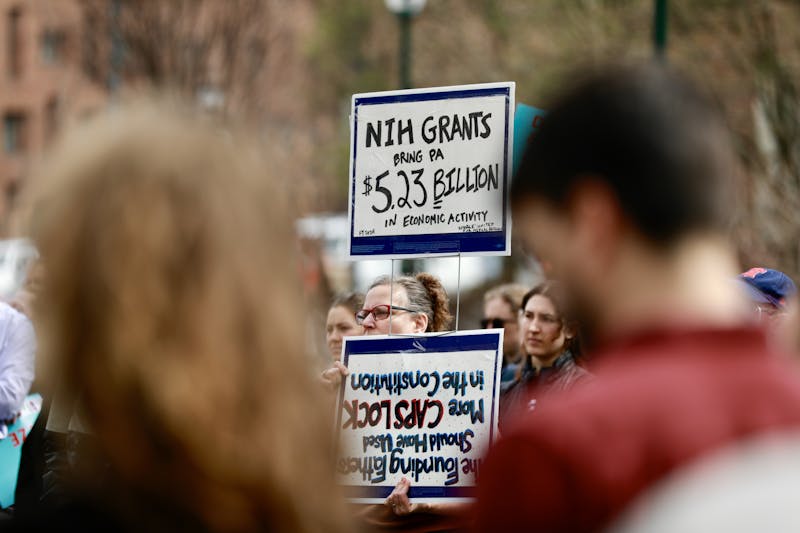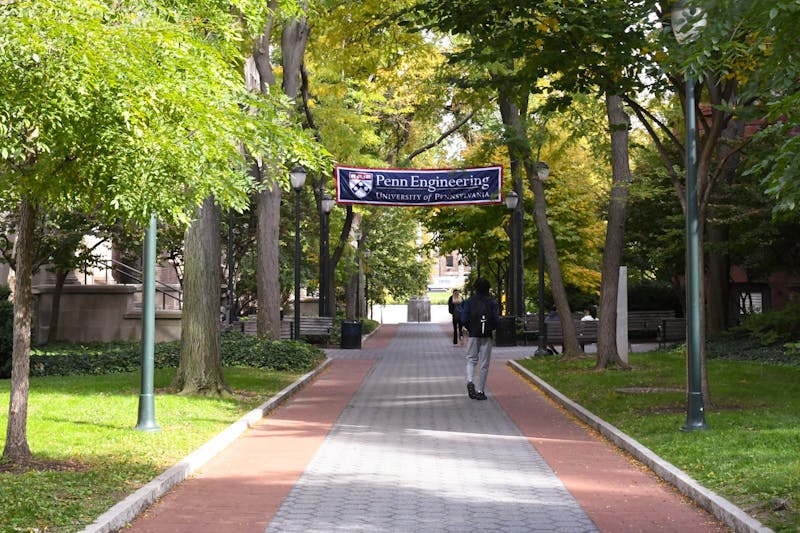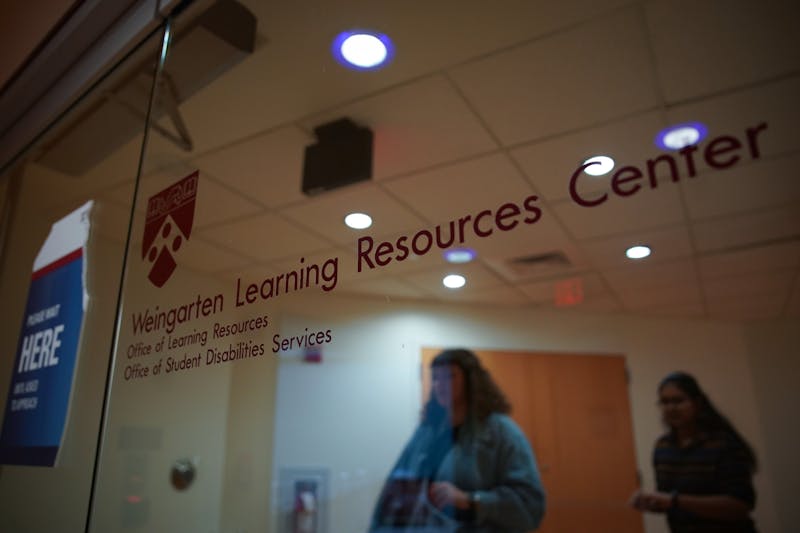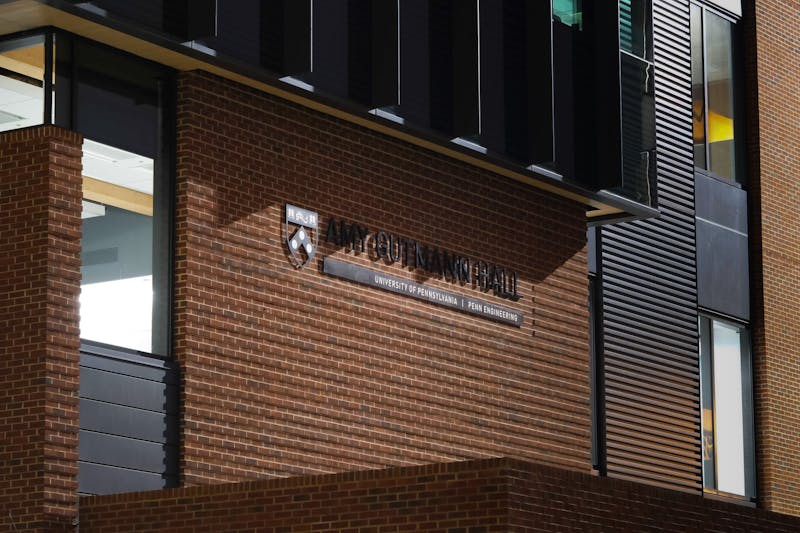
The Daily Pennsylvanian recently spoke with University administrators to understand how artificial intelligence should be used in classes.
Credit: Zoé MackeyAs artificial intelligence rapidly advances, The Daily Pennsylvanian spoke with University leadership and faculty to explore how AI can be effectively integrated into the Penn education.
Penn administrators cited the importance of flexible use in the classroom and allowing professors to set their own policies based on their course goals. All faculty who spoke to the DP agreed that a “one size fits all” universal policy regarding AI at Penn would not work, and stressed that faculty support, transparency, fairness, and creativity in AI use are key to ensuring it advances, rather than detracts, from student learning.
In November 2023, the University released guidelines for AI use in the classroom, outlining nine categories of usage — transparency, accountability, bias, privacy and contracts, patient privacy protection, security, data scraping, intellectual property, and University business processes.
The guidelines support the use of generative AI but stipulate that the databases must be used per Penn's mission, which is to "lay a durable foundation for critical and creative thinking." The guidelines also emphasize the importance of citing AI in all cases of use per the University’s Code of Academic Integrity.
In an interview with the DP, College of Arts and Sciences Dean Peter Struck described the current AI moment as the “most important inflection point” he has seen in his 25 years in higher education.
He emphasized that while a universal AI policy is impractical due to the wide variety of course objectives and assignments, professors must be transparent about their expectations regarding AI use.
Struck explained that transparency is essential because different professors have different policies — and in some cases penalties — surrounding AI use.
“We need to make sure that … professors are very clear with students as to what their expectations are about the use of AI and assignments,” Struck said.
To address concerns that surround AI, Struck suggested that professors make exams in person or design assignments that are “ChatGPT-proof” by incorporating creative elements. He emphasized that while the core goals of liberal arts have not changed in the age of AI, the “means of measuring intellectual outcomes must evolve.”
“We need to make very clear creative new modes of measuring these intellectual outcomes that we care about," Struck said. "And they are no less important than they’ve always been.”
History professor and Director of the Center for Teaching and Learning Bruce Lenthall also agreed that it is crucial that professors are explicit about their policies and expectations regarding AI.
“AI is going to force us to think about what we really want students to learn, to know how to do,” Lenthall said. He also explained that it is “not fair to students” to expect them to follow a guideline without being held accountable.
Considering that many AI tools now require paid subscriptions, both Lenthall and Stuck agreed that equity and access to AI tools are a “crucial” part of the conservation surrounding AI usage in academic settings.
While neither the University nor the College has any current policies in place to address this issue, Lenthall said that administrators and faculty are “very aware of it” and are trying to work out the logistics of such a solution.
Lenthall also pointed to a monthly CETLI-run workshop seminar open to faculty across all 12 Penn schools to explore how to integrate AI into the classroom. According to Lenthall, CETLI’s aim with these workshops is to help faculty understand “what is out there” and how to understand different AI tools. Lenthall said that this series has become their most popular program.
One professor who has taken advantage of CETLI’s resources is History professor Peter Holquist, who says that he has found them to be “very helpful.”
Holquist recalled a “wild west” atmosphere in Spring 2022 when AI tools like ChatGPT first became mainstream and most professors lacked formal policies. Through CETLI’s workshops and discussions with colleagues, Holquist explained that he started to see AI as a tool that, while can be helpful, must be used with caution.
Senior lecturer and Director of the Modern Japanese Language Program Tomoko Takami also attended the CETLI workshops. She said that she found learning alongside and sharing “common concerns” with other faculty members “really helpful” and has “appreciated the training” offered by the Center. She said that “like students, we are also learning what AI can and cannot do,” especially in the teaching context.
Takami explained that while the Modern Japanese Language Program has no universal policy regarding AI — and has no plans to instate one — 3 of the 5 full-time faculty in the program are using AI actively in their classes to assist in Japanese language learning.
Lecturer in the program Nana Takeda-Kolb wrote a study on AI usage in beginning Japanese courses, which suggests “integrating critical content-based instruction with generative AI to enhance language learning outcomes, promoting critical thinking, cultural awareness, and student agency.”
When asked about the issue of equal access to AI tools and platforms, Takami said she was “concerned” about potential inequalities but also cited Takeda-Kolb’s work, which found “no significant difference” on quality of student work that used paid versus free AI services. However, she said that if or when evidence shows a notable difference, she will seek funding for students or mandate all students use free versions of AI tools.
Holquist stressed the importance of faculty “freedom and independence” in crafting AI policies for their courses. He expressed concern of students “shortchanging themselves” in courses such as his, which are designed to develop analytical writing and thinking skills.
Holquist said he will continue to assign a seven-page analytical paper in his class — rather than changing exam formats as some of his colleagues have — because he believes that “the skills it cultivates are skills that are useful to have, although there is a much greater risk of students using AI.”
In October of this year, the University formed an AI Council led by five senior faculty members which will provide strategic input, coordinate multidisciplinary research, and develop new AI-related initiatives.
During the Board of Trustees fall meetings, AI was a recurring theme. The Academic Policy Committee included a discussion of "Strategic Initiatives in Data Science and Artificial Intelligence" with Penn faculty members. Perelman School of Medicine professor Marylyn Ritchie addressed the role that AI can play in sophisticated modeling and how students should engage with AI at Penn.
"A student shouldn't leave Penn before knowing how to use AI and how to be careful with it," Ritchie said. "We need to know how to educate everyone about AI."
Graduate School of Education Dean Katharine Strunk also discussed AI use during the meeting of the Local, National, and Global Engagement Committee. Strunk advocated for GSE faculty to incorporate AI into their teaching rather than discourage students from using the technology.
Struck said that students can expect to hear from him directly early next semester about AI usage, which he says will address “where we are on this,” while also reminding them that they are still responsible for completing their own work.
He also maintained an optimistic view of AI’s potential in education, hoping that in the future it will be able to “offload” some of the “laborious and manual” tasks for students, enabling them to to focus on “higher order stuff that only live, living humans are capable of.”
“This is what separates us from everything else in the universe. We’re capable of independent thought,” Struck continued.
He explained that harnessing the power of AI will create “a new kind of classroom environment that focuses on a very high order kind of intellectual operation,” and will allow faculty to expect even more from students on an intellectual level.
Struck expressed confidence in the College’s ability to adapt, saying “we’ve got 6,000 of the best students …between 18 and 22 in the world … we have 500 most talented people in the world in their fields in the faculty.”
“Of course they’re going to be committed to new knowledge in a real and meaningful way,” he concluded.
The Daily Pennsylvanian is an independent, student-run newspaper. Please consider making a donation to support the coverage that shapes the University. Your generosity ensures a future of strong journalism at Penn.
Donate











